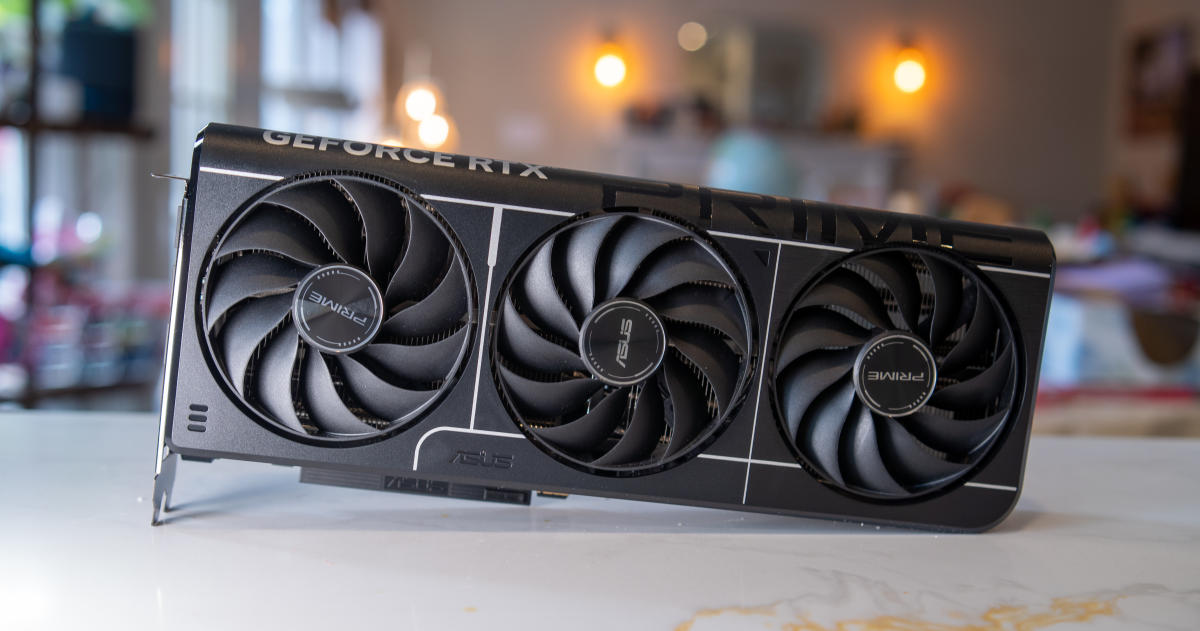NVIDIA GeForce RTX 5070 Ti Review: A Sensible 4K Powerhouse for $749
It’s hard to recall the simpler times of buying video cards, before the era of crypto enthusiasts, supply chain issues, and pandemic demand pushed GPU prices far beyond the rising costs of manufacturing. Ideally, the $549 RTX 5070 and $749 RTX 5070 Ti would be more reasonable alternatives to the $2,000 RTX 5090 and $1,000 5080. However, card manufacturers and retailers have already inflated the prices of the RTX 5070 models beyond their MSRPs. The review unit, the ASUS 5070 Ti Prime, is currently priced at $900 at Best Buy and $750 at Newegg, although availability is an issue.
While the actual cost of any RTX 5070 Ti card is uncertain, it’s clear that they will be solid 4K performers for significantly less than the RTX 5080 and 5090. However, if you’re not in dire need of an upgrade, it’s worth waiting a few months for inventory and prices to stabilize.
Hardware
The RTX 5070 Ti offers the best balance between performance and value in NVIDIA’s lineup, based on its specs and hopeful pricing. It features 8,960 CUDA cores and 16GB of GDDR7 VRAM, which is below the 5080’s 10,752 CUDA cores but at least matches its memory. The cheaper 5070 comes with only 12GB of VRAM, which may be a limitation for 4K gaming. The ASUS 5070 Ti card has a 2.5-slot design, making it suitable for small form-factor cases, and its peak power draw of 300 watts means it can run comfortably with an 850W PSU.
| Model | Architecture | CUDA Cores | AI TOPS | Tensor Cores | RT Cores | VRAM | Memory Bandwidth | TGP |
|---|---|---|---|---|---|---|---|---|
| RTX 5090 | Blackwell | 21,760 | 3,352 | 5th Gen | 4th Gen | 32 GB GDDR7 | 1,792 GB/sec | 575W |
| RTX 5080 | Blackwell | 10,752 | 1,801 | 5th Gen | 4th Gen | 16 GB GDDR7 | 960 GB/sec | 360W |
| RTX 5070 Ti | Blackwell | 8,960 | 1,406 | 5th Gen | 4th Gen | 16 GB GDDR7 | 896 GB/sec | 300W |
| RTX 5070 | Blackwell | 6,144 | 988 | 5th Gen | 4th Gen | 12 GB GDDR7 | 672 GB/sec | 250W |
| RTX 4090 | Lovelace | 16,384 | 1,321 | 4th Gen | 3rd Gen | 24 GB GDDR6X | 1,008 GB/sec | 450W |
The 5070 Ti’s support for multi-frame generation in DLSS 4 makes it a capable GPU for 4K gaming. This technology allows the GPU to generate up to 3 frames with AI for every frame rendered in real-time, resulting in a smoother gameplay experience.
In use: A capable 4K gaming GPU
In benchmarks, the RTX 5070 Ti is only slightly faster than the 4070 and 4070 Ti. However, in actual gaming performance, the 5070 Ti shines, particularly with DLSS 4 support. It handled demanding games like Dragon Age: The Veilguard and Cyberpunk 2077 with ease, reaching high frame rates in 4K with ray tracing and graphics settings maxed out.
| GPU | 3DMark TimeSpy Extreme | Geekbench 6 GPU | Cyberpunk (4K RT Overdrive DLSS) | Blender |
|---|---|---|---|---|
| RTX 5070 Ti | 12,675 | 238,417 | 153fps (4X frame gen) | 7,365 |
| RTX 5090 | 19,525 | 358,253 | 246fps (4X frame gen) | 14,903 |
| RTX 4070 Ti Super | 11,366 | 220,722 | 75fps (1x frame gen) | 7,342 |
| RTX 4070 | 8,610 | N/A | 45fps (1x frame gen) | 6,020 |
Should you buy the RTX 5070 Ti?
The RTX 5070 Ti is a great option for 4K gaming, especially with DLSS 4 support. However, its pricing is a concern, and it’s essential to wait for prices to settle before making a purchase. If you can get it close to $750, it’s a good buy, but at $900 or above, it’s less compelling.
The RTX 5070 Ti’s 16GB of VRAM and higher CUDA count make it a future-proof option, especially for 4K gaming. However, if you’re content with 1,440p gaming, the 5070’s 12GB of VRAM may be sufficient. Ultimately, the decision to buy the RTX 5070 Ti depends on your specific gaming needs and budget.
Wrap-up: A great 4K card… if you can get it close to $750
The RTX 5070 Ti is a capable 4K gaming GPU that offers a great balance between performance and value. Its support for multi-frame generation in DLSS 4 makes it a compelling option for enthusiasts. While its pricing is a concern, if you can get it close to $750, it’s a great buy. However, it’s essential to wait for prices to settle and consider your specific gaming needs before making a purchase.
Source Link





